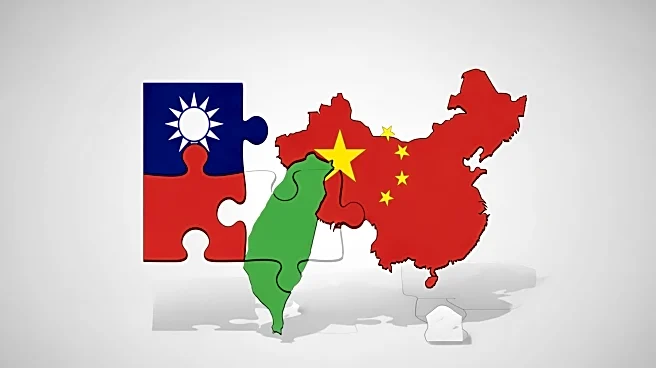What's Happening?
The economic relationship between Taiwan and China is marked by a paradox of intense interdependence despite political tensions. Taiwan, officially the Republic of China, does not maintain diplomatic relations with the People's Republic of China, yet
China is Taiwan's most significant trading partner. Bilateral trade reached a record $205 billion in 2022, highlighting the economic importance of this relationship. Despite China's view of Taiwan as a renegade province, both economies are closely intertwined, particularly in technology supply chains. Taiwan's semiconductor industry, led by Taiwan Semiconductor Manufacturing Company (TSMC), plays a crucial role globally, producing 90% of the world's cutting-edge logic chips. This interdependence is a strategic factor in global economics, with potential risks of armed conflict across the Taiwan Strait posing a threat to the global economy.
Why It's Important?
The economic ties between Taiwan and China are significant due to Taiwan's central role in global technology supply chains, especially semiconductors. This interdependence presents both opportunities and risks, as Taiwan's economy heavily relies on China as a market and manufacturing base. The geopolitical dimension adds urgency, with potential armed conflict posing a major risk to the global economy. Taiwan's semiconductor industry is vital, making the region's stability crucial for global economic stakeholders. The relationship underscores the complexities of globalized economies where economic logic often overrides political differences.
What's Next?
The future of Taiwan-China economic relations may involve further negotiations and agreements to liberalize economic ties, as seen with the Economic Cooperation Framework Agreement (ECFA). However, political tensions and strategic efforts to minimize risks are increasing. Taiwan's market diversification strategy, known as the 'New Southbound Policy,' aims to reduce reliance on China by increasing exports to other regions. Investment flows are shifting, with Taiwanese companies investing more in Southeast Asia and India, reflecting a strategic reorientation.
Beyond the Headlines
The economic interdependence between Taiwan and China highlights ethical and strategic dilemmas. Taiwan's reliance on China for economic growth contrasts with its political autonomy aspirations. The semiconductor industry's role as a 'Silicon Shield' provides leverage but does not diminish China's desire for unification. The relationship exemplifies how economic interests can overcome political barriers, yet the potential for conflict remains a global concern.
















